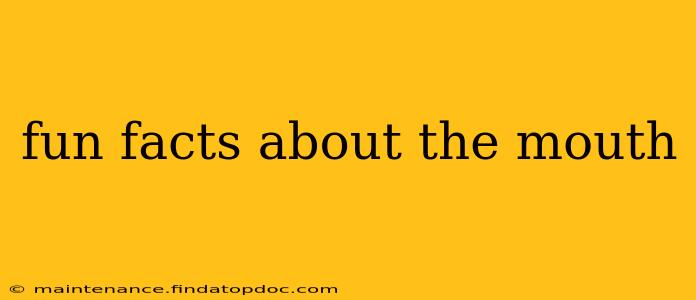Fun Facts About the Mouth: A Deep Dive into Your Oral Cavity
The mouth – that amazing, multitasking marvel – is far more fascinating than you might think. Beyond chewing, talking, and kissing, your mouth plays a crucial role in your overall health and wellbeing. Let's explore some fun, surprising, and even slightly gross facts about this incredible organ.
How Many Taste Buds Do You Really Have?
This is a classic question, and the answer might surprise you! While you might have heard the number 10,000 thrown around, the actual number of taste buds varies greatly from person to person. Estimates range from 2,000 to 10,000, and the number can decline with age. Furthermore, the location of taste buds isn't limited to your tongue; you also have them on your soft palate and even in your throat!
What's the Strongest Muscle in Your Body?
Contrary to popular belief, it's not your biceps or your quads. It's actually your masseter muscle, located in your jaw. This powerful muscle is responsible for chewing and grinding your food, enabling you to tackle even the toughest steak or crunchiest vegetables.
Saliva: More Than Just Water
Saliva isn't just a wet, slippery substance; it's a complex fluid with several important functions. Beyond moistening your mouth and aiding in digestion, saliva contains enzymes that begin breaking down carbohydrates even before they reach your stomach. It also helps protect your teeth from decay and plays a role in your immune system.
Why Do We Have Wisdom Teeth?
Our ancestors used wisdom teeth to grind down tough plant matter. As our diets evolved, the need for these extra molars diminished. Many people today never develop wisdom teeth, while others experience painful and problematic eruptions. This evolutionary leftover serves as a reminder of our past.
The Mouth's Role in Speech
The complex interplay of your tongue, lips, teeth, and jaw allows for the creation of thousands of different sounds, forming the foundation of human language. The precision and coordination involved in speaking are truly remarkable. Consider how quickly and effortlessly you can switch between different sounds and syllables!
Can Your Mouth Heal Itself?
Yes! Your mouth possesses remarkable self-healing capabilities. Minor cuts and abrasions usually heal quickly due to the constant production of saliva and the rich blood supply in the area. This efficient healing process is one reason why your mouth is relatively resistant to infection.
What is the Science Behind Yawning?
While the exact reason why we yawn remains a mystery, theories suggest that yawning might be related to thermoregulation (controlling body temperature), alertness, and social contagion. Interestingly, yawning is contagious; observing someone yawn often triggers a yawn in others.
Why Does Your Mouth Water When You're Hungry?
This is a classic example of your body's anticipatory mechanisms. When you see or smell delicious food, your brain anticipates the meal and signals your salivary glands to increase saliva production, preparing your mouth for digestion. This response is a testament to the intricate connections between your senses, brain, and digestive system.
The Microbial Ecosystem in Your Mouth
Your mouth isn't sterile; it's teeming with millions of bacteria, viruses, and fungi. Most of this microbiota is harmless and even beneficial, aiding in digestion and protecting against harmful pathogens. However, an imbalance in this ecosystem can lead to various oral health problems, highlighting the importance of good oral hygiene.
This exploration only scratches the surface of the wonders of the mouth. From its powerful muscles to its complex microbial community, the mouth is a fascinating and vital part of the human body. Maintaining good oral hygiene is essential for its health and overall well-being.
